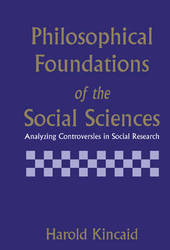
|
Philosophical Foundations of the Social Sciences: Analyzing Controversies in Social Research
Hardback
Main Details
| Title |
Philosophical Foundations of the Social Sciences: Analyzing Controversies in Social Research
|
| Authors and Contributors |
By (author) Harold Kincaid
|
| Physical Properties |
| Format:Hardback | | Pages:302 | | Dimensions(mm): Height 229,Width 152 |
|
| Category/Genre | Philosophy of science |
|---|
| ISBN/Barcode |
9780521482684
|
| Classifications | Dewey:300.1 |
|---|
| Audience | | Professional & Vocational | |
|---|
| Illustrations |
9 Line drawings, unspecified
|
|
Publishing Details |
| Publisher |
Cambridge University Press
|
| Imprint |
Cambridge University Press
|
| Publication Date |
24 November 1995 |
| Publication Country |
United Kingdom
|
Description
This book defends the prospects for a science of society. It argues that behind the diverse methods of the natural sciences lies a common core of scientific rationality that the social sciences can and sometimes do achieve. It also argues that good social science must be in part about large-scale social structures and processes and thus that methodological individualism is misguided. These theses are supported by a detailed discussion of actual social research, including theories of agrarian revolution, organizational ecology, social theories of depression, and supply-demand explanations in economics. Professor Kincaid provides a general picture of explanation and confirmation in the social sciences and discusses the nature of scientific rationality, functional explanation, optimality arguments, meaning and interpretation, the place of microfoundations in social explanation, the status of neo-classical economics, the role of idealizations and non-experimental evidence, and other specific controversies.
Reviews"...Kincaid convincingly argues that both the natural sciences and the social sciences have a common core of scientific rationality based on naturalism and holism...This work is highly recommended to philosophers of science, social scientists, and graduate students in philosophy or in any of the social sciences." Choice "...well argued and necessary in arguing in many cases what should have been obvious for at least a century, but is still a minority view in contemporary discourse." Aviezer Tucker, Dialogue
|